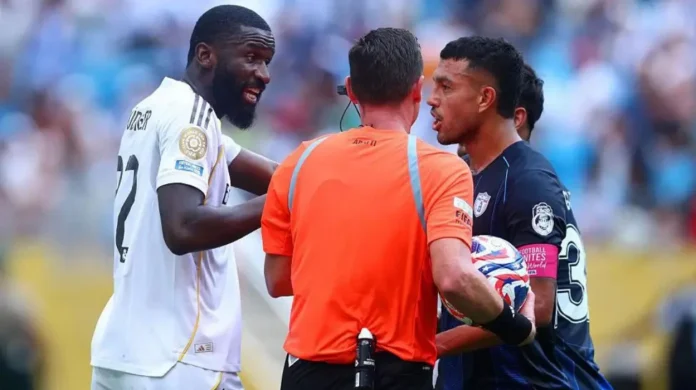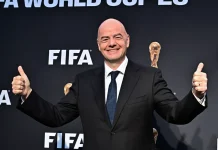The 2025 FIFA Club World Cup was meant to be a celebration of global football excellence. Yet, the tournament has been overshadowed by an incident in its closing minutes that underscores FIFA’s ongoing struggle to uphold its own anti-racism commitments. On June 22, during Real Madrid’s 3-1 win over Mexican side Pachuca in Charlotte, North Carolina, Antonio Rüdiger, Real Madrid’s German centre-back, alleged that he was racially abused by Pachuca’s captain Gustavo Cabral. The fallout from this confrontation has sparked renewed scrutiny of FIFA’s disciplinary mechanisms, its approach to anti-racism, and the cultural grey areas that allow football’s governing body to delay or dilute accountability.
What Happened During the Match Between Real Madrid and Pachuca?
As the game entered stoppage time, a heated verbal and physical confrontation erupted between Rüdiger and Cabral. According to Real Madrid staff,
“Rüdiger immediately informed the referee of racial abuse”,
prompting Brazilian official Ramon Abatti to activate FIFA’s anti-racism protocol. Abatti crossed his forearms in front of his chest—a signal that initiates a three-step intervention process: pausing the match, issuing warnings, and potentially abandoning the game if abuse continues.
FIFA’s protocol, although commendable on paper, appeared reactive rather than proactive. The incident did not result in an immediate halt of the game, and questions remain about whether the protocol was followed with due diligence or simply performed for optics. The match continued and concluded without further interruption.
FIFA’s Tepid and Vague Response to the Abuse Claim
In the hours following the match, FIFA issued a guarded statement:
“Following an assessment of the match reports, the FIFA Disciplinary Committee has opened proceedings against Pachuca player Gustavo Cabral in relation to the incident involving him and Real Madrid’s Antonio Rüdiger.”
However, the governing body has refrained from releasing specifics about the evidence it is reviewing or what potential disciplinary measures might result. This deliberate ambiguity has drawn criticism from players, human rights advocates, and anti-racism campaigners who have long accused FIFA of performative action in such cases.
The expectation is for a verdict before Pachuca’s final group match—though ironically, the Mexican club has already been eliminated from the tournament. This has prompted accusations that FIFA is waiting for the controversy to quietly fade away, shielding itself from taking a meaningful stand.
Real Madrid and Xabi Alonso Stand Firm with Rüdiger
While FIFA hesitated, Real Madrid moved swiftly to show solidarity with its player. In the post-match press conference, head coach Xabi Alonso was unequivocal:
“That’s what Rüdiger said, and we believe him,”
he stated.
“It is important to have zero tolerance in these kinds of situations. FIFA now is investigating. That’s all I can say.”
Alonso further emphasized,
“We stand by Toni and will await the outcome. The FIFA protocol has been initiated, and we support him. It’s intolerable, and we trust his account. An investigation is underway.”
The club’s immediate and public support highlights the importance of institutional backing for players facing discrimination, particularly in an environment where governing bodies often prioritize reputation management over accountability.
Gustavo Cabral Denies Racist Intent and Cites Cultural Misunderstanding
Cabral, for his part, has vehemently denied any racist intent.
“It was a fight, we collided, he said that I hit him with my hand and then there was an argument and the referee made the sign of racism,”
he told reporters.
“In Argentina we say ‘cagón de mierda’ all the time—I told him the same thing.”
According to Cabral, the term was a routine Argentine insult meaning “coward,” not a racial epithet.
He elaborated:
“It was merely a phrase we often use in Argentina. I told him the same thing, and that was the end of it. It got a bit heated as we headed to the locker room, and he seemed to want to confront me. In that moment, emotions were high as we both moved towards the corner leading to the dressing room, and we exchanged words, but nothing more.”
Cabral’s defense hinges on a cultural context argument—raising deeper questions about how FIFA determines the intent and meaning behind words in a multinational sport where phrases can vary drastically in connotation across languages and regions.
Rüdiger’s History with Racism and His Quiet Strength
Though Rüdiger did not make an immediate public statement, his previous writings and experiences cast a long shadow over this incident. In a powerful 2021 article for The Players’ Tribune, Rüdiger wrote, “nothing ever really changes” in regard to racism in football. His weariness with empty gestures and symbolic actions echoes in this latest episode.
The fact that Rüdiger’s complaint was taken seriously this time, at least in terms of protocol activation, does not erase the broader issue: players of color still carry the burden of proof when it comes to racist incidents. That burden is not just emotional, but institutional—deeply rooted in how football responds to prejudice.
FIFA’s Anti-Racism Protocol: Policy vs. Practice
FIFA’s much-touted three-step protocol was initiated, yet the organization’s subsequent silence has cast doubt on the sincerity and efficacy of its measures. Activists and commentators have noted the conspicuous absence of anti-racism banners and messaging at this year’s Club World Cup—unlike previous tournaments, where “Say No to Racism” was prominently displayed.
This soft-pedaling of anti-racism rhetoric has not gone unnoticed. Critics argue that FIFA’s messaging during the tournament appeared “subdued and inconsistent”, especially when compared to prior campaigns. It raises uncomfortable questions: is FIFA pulling back from strong anti-racism posturing in favor of maintaining a non-confrontational global image?
Culture, Context, and the Problem of Interpretation
Cabral’s use of regional slang exposes a long-standing issue in international sport: how does one balance linguistic nuance with universal standards of respect?
Cabral’s argument that
“it was just an Argentine insult”
may hold water culturally, but FIFA’s role is to assess whether those words had a racially discriminatory impact in a global context. The organization cannot hide behind semantics or regional dialects to excuse behavior perceived as harmful.
More dangerously, this defense creates a slippery precedent. If intent becomes the dominant metric, rather than impact, then accountability becomes subjective—and abusers can claim ignorance or cultural difference as a shield.
Why FIFA’s Inaction Endangers Player Safety
Rüdiger’s experience is not isolated. From Vinícius Júnior in Spain to Romelu Lukaku in Italy, Black footballers across leagues have reported abuse—with varying degrees of institutional response. This inconsistency “undermines trust in the system,” said one anti-racism advocate, speaking on condition of anonymity. If players believe the protocol is hollow, they are less likely to report future incidents.
Player unions and advocacy groups have long pushed for swifter, more transparent disciplinary processes. They argue that real deterrence comes not just from initiating investigations, but from ensuring visible consequences. FIFA’s current approach—delayed rulings, vague announcements, and behind-the-scenes decisions—does little to inspire confidence.
The Way Forward: Real Accountability or PR Maneuvering?
If FIFA wishes to repair its credibility, it must act decisively and transparently. Cabral’s case offers the organization a moment of reckoning: not merely to judge guilt or innocence, but to clarify how it will handle racially sensitive language across cultures, and whether it will prioritize the lived experience of affected players over protecting tournament optics.
That includes publicly releasing the findings of its investigation, detailing how it interpreted Cabral’s language, and outlining how it plans to better enforce its anti-racism standards going forward. Anything less risks confirming what Rüdiger wrote years ago: that in football,
“nothing ever really changes.”
FIFA’s Silence Is Its Loudest Statement
The incident involving Rüdiger and Cabral is not just a case of two players clashing; it is a microcosm of football’s ongoing racial crisis and FIFA’s ambivalence in confronting it. While clubs like Real Madrid take unequivocal stances, FIFA clings to bureaucratic opacity. Until the organization aligns its actions with its rhetoric, every new protocol activation will feel more like performance than progress.
Football deserves better. Players deserve better. And fans—those who believe in the sport’s power to unite across borders—deserve a FIFA that leads, not lags, in the fight against racism.













